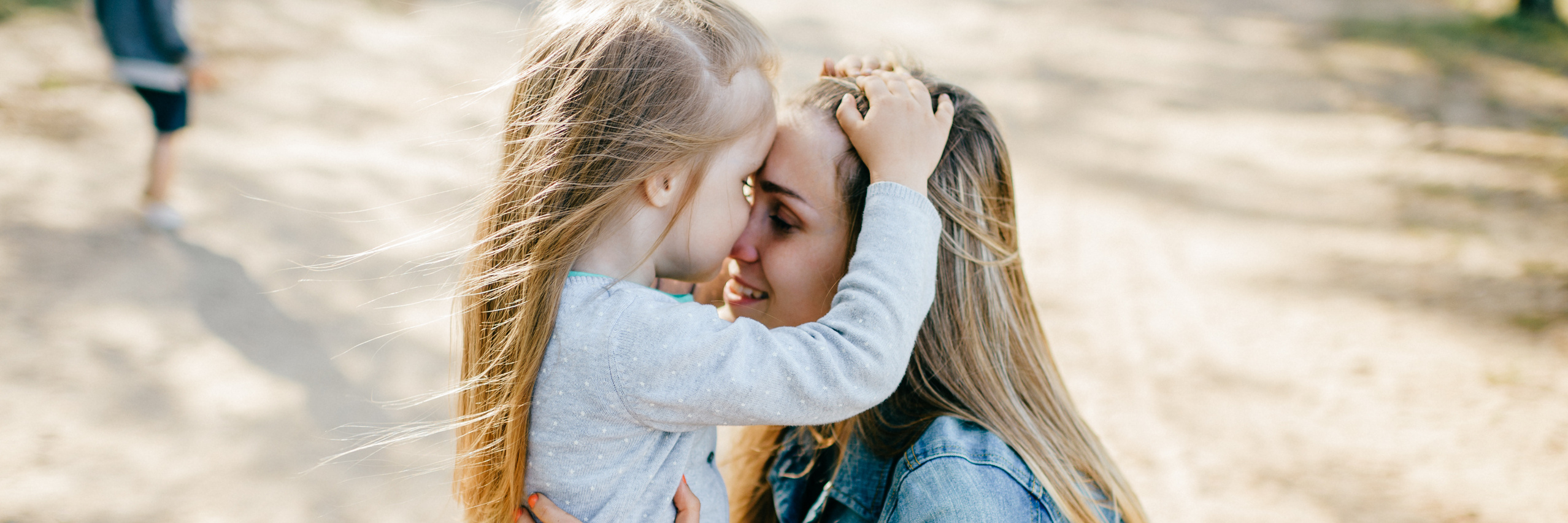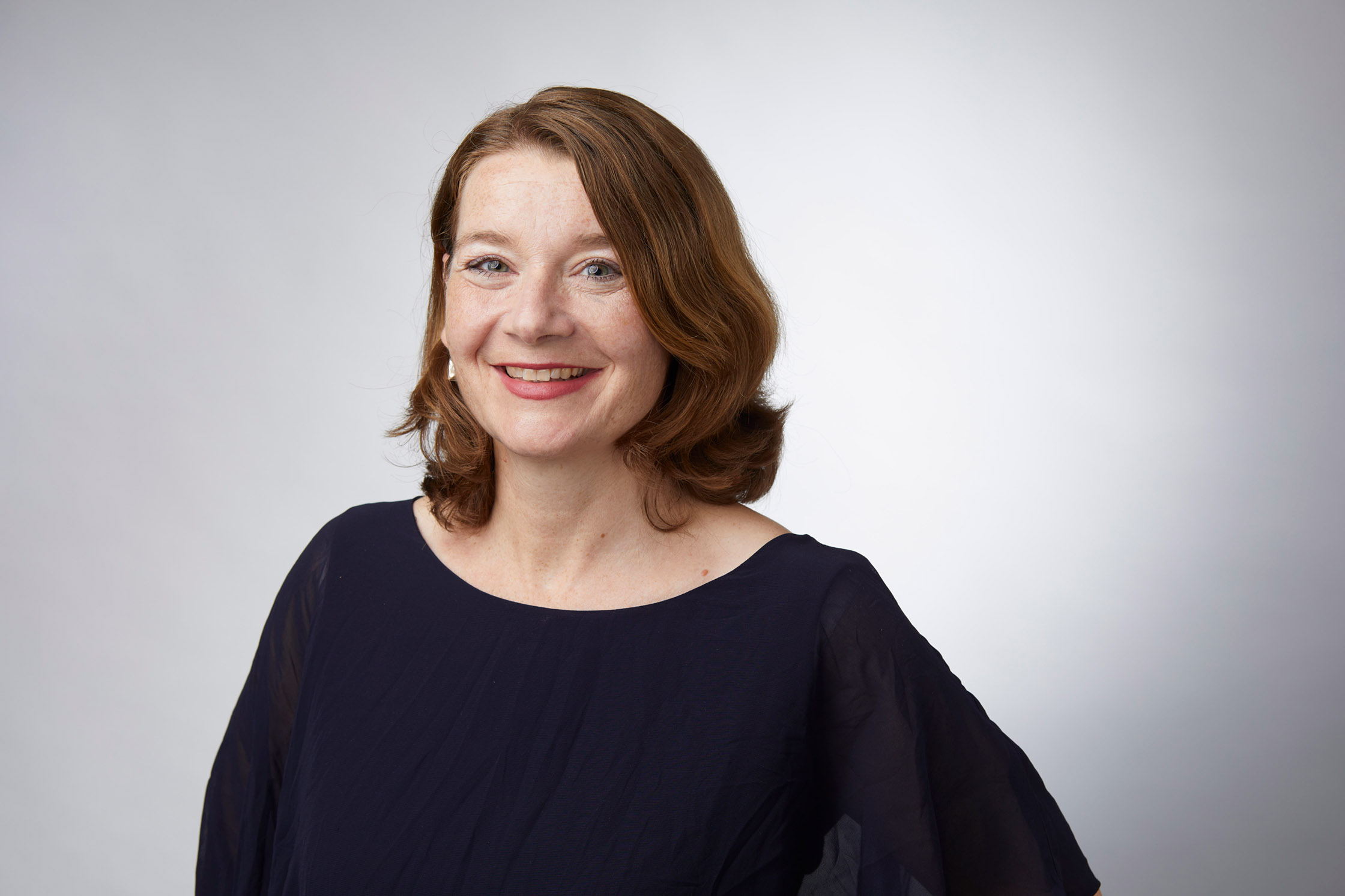“Think about the children as well”

An estimated five million children and adolescents in Germany grow up with a parent who is mentally ill or addicted. They are often obliged to take on family responsibilities at an early age and exposed to considerable burdens through their mother’s or father’s illness. “They are usually the next generation to become ill,” says Yvonne Grimmer, physician and Professor of Social Medicine and Health Sciences at h_da. That is why she launched the “Strong in the Storm” initiative, which is already working successfully in Baden-Württemberg. At five clinics there, family and child welfare officers take care not only of the patients but also their offspring: a preventative approach that Grimmer wants to put into practice in Hesse too.
By Astrid Ludwig, 24.4.2025
Yvonne Grimmer worked for 21 years as a physician and senior consultant in child and adolescent psychiatry at the Central Institute of Mental Health (CIMH) in Mannheim, of which ten in the outpatient department. She knows very well that children suffer too when their parents are ill. In October last year, she joined the Faculty of Social Work at Darmstadt University of Applied Sciences (h_da) as Professor of Social Medicine and Health Sciences. “I have fished children out of the river for 21 years. Now it was time to move upstream and find out why they fall in,” she says, explaining her career move. Addiction, she says, can be passed down through generations. If children and adolescents grow up in a family where a parent is mentally ill or addicted, they statistically have a three to four times higher risk of becoming ill themselves in the course of their lives.
Early help for families
“I want to prevent these children from becoming my patients later on,” says child and adolescent psychiatrist Grimmer, which is why she launched the “Strong in the Storm” project in 2018. This was in Mannheim during her time at the Central Institute of Mental Health. When she moved to Darmstadt, she brought this initiative to h_da and Hesse too. The university has been one of the initiative’s cooperation partners since October 2024 and has allocated 50 percent of Yvonne Grimmer’s worktime to “Strong in the Storm” until 2027. In this way, she is able, as a social physician and health scientist, to sharpen the eye of future social workers at h_da’s Faculty of Social Work especially towards this young clientele and at the same time further develop the initiative.

The aim of “Strong in the Storm” is prevention. “We want to give families direct help at an early stage.” Children of parents with a mental health condition or an addiction do not have the same opportunities as boys and girls from an intact family environment. Poverty is another factor and “tantamount to a reduction in life expectancy of about ten years,” says Professor Grimmer. Weak social conditions generally go hand in hand with a poorer housing situation, fewer opportunities for personal development and recreation and less awareness about healthy eating.
If their mother or father is addicted or mentally ill, the child is usually obliged to take on tasks in the family from an early age. In her experience, says Professor Grimmer, “They often have to cook, do the shopping and look after their siblings. They must assume a lot of responsibility, feel left alone with the situation and don’t know who to turn to.”
During her time in Mannheim, about 300 affected parents were treated in the clinic each year. “However, only a few of their children were referred to us.” In individualised medicine, she says, there is a narrow focus on the patient and not on their environment. The person is not seen as a whole. “Too little attention is paid to the children,” adds Grimmer. And the parents themselves often do not have the courage to mention them either – because they are ashamed or feel guilty. “Being mentally ill or addicted and a good parent at the same time takes an enormous effort. That’s why it’s our job to bring up the topic of childcare.”
Successful results in five clinics
This is precisely the goal that the “Strong in the Storm” initiative has set itself. Over the past seven years, Yvonne Grimmer has built up a support network in Baden-Württemberg, together with her colleague Professor Anne Koopmann, a consultant psychiatrist. The initiative has been able to establish permanent family welfare officers in five clinics – the Central Institute of Mental Health (CIMH) in Mannheim, Heidelberg University Hospital, the Clinic for Addiction Therapy and Withdrawal at the Psychiatric Centre North Baden (PZN) in Wiesloch, the Centre for Psychiatry South Württemberg (ZfP) and the Klinikum am Weissenhof / Centre for Psychiatry Weinsberg. This has been made possible since 2020 with the help of financial support from the Dietmar Hopp Foundation, which has granted “Strong in the Storm” funds of around €1.8m over two funding periods until 2027. Baden-Württemberg’s Ministry of Social Affairs, Health and Integration is contributing an additional €200,000. These funds are financing staff costs in the five clinics.
Since then, the family welfare officers have been able to recruit 197 volunteer child welfare officers to take care of children at the clinics. In most cases, employees from social services or from among the nursing staff assume this task. Asking patients about their parenting responsibilities at the time of their admission has since become mandatory. The child welfare officers ask all patients about their daughters or sons and offer help. “The first appointment takes place during treatment in the clinic, the second one outside. It’s important that personal contacts have already been established and that those affected know the people helping them,” says Grimmer. The five family welfare officers train the child welfare officers, form networks with local child and youth welfare services, oversee child protection cases and offer workshops and advice.
Establishing the initiative in Hesse too
“It’s important to think about the children right from the start as well. We have to intervene at an early stage,” says Professor Grimmer. “This should actually become the norm in all clinics in Germany,” she thinks. Experts estimate that three to four million children have mentally ill parents and another approximately two million girls and boys have addicted parents, along with a high number of unreported cases. The former government, which passed a joint motion by the SPD, CDU, Greens and FDP in January 2025 stating that prevention should be improved and children of mentally and addicted parents receive more support, also recognised the need for action. This has given Professor Grimmer cause to hope that more governmental assistance will be forthcoming. In Scandinavian countries such as Norway, this is already a matter of course. According to Grimmer, all clinics there already ask about patients’ parenting responsibilities and offer help for children.
“There is tremendous demand in Hesse too,” says Grimmer, which is why the initiative has already established initial contacts in the Rhine-Main region, alongside discussions in Rhineland-Palatinate and Bavaria. “In May, we will present our concept at University Hospital Frankfurt. We would like ‘Strong in the Storm’ to expand to Hesse,” announces Grimmer. She would also like to work together with the ministry in Wiesbaden, various foundations and other clinics.
But are there enough services in place to which parents and children needing help can be referred? “There are many alternatives in the big cities,” says Grimmer. But those affected need to be familiar with them and accept them. In rural areas, by contrast, many services have collapsed since the coronavirus pandemic and the journey to the remaining services is often long and expensive, which is why the “Strong in the Storm” initiative is calling for financial support to help families attend in the future.
More attention
Overall, Professor Yvonne Grimmer and her colleagues want to raise more attention and awareness towards the needs of children whose parents have a mental illness or addiction – among the general public as well as in clinics and support facilities. She also wants to inspire her students – in the shape of internships as well as Bachelor’s or Master’s theses – and has already been partially successful. In October, a Master’s student from the Faculty of Media will start work on an animated video for “Strong in the Storm”. The project is a collaboration with Professor Georg Struck from the Faculty of Media. Its goal: “We want to help the children.”
Contact our Editorial Team
Christina Janssen
Science Editor
University Communications
Tel.: +49.6151.533-60112
Email: christina.janssen@h-da.de
Translation: Sharon Oranski